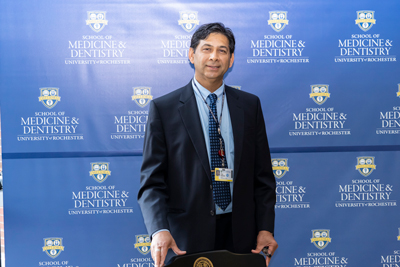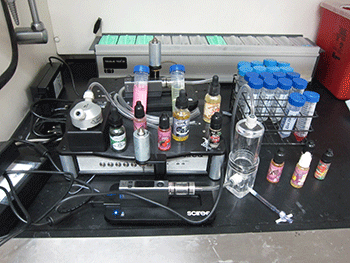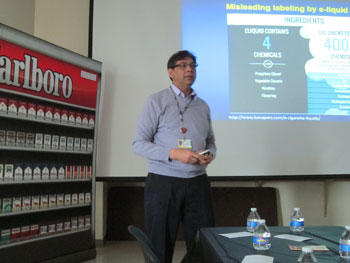Irfan Rahman Named ATS Fellow
Wednesday, October 31, 2018
Irfan Rahman, Ph.D., professor of environmental medicine, public health sciences, dentistry and medicine has been designated as an American Thoracic Society Fellow for his pulmonary science accomplishments and services to international lung community.
Dr. Rahman's lab is interested in understanding the redox signaling, mechanism of proinflammatory gene expression by studying the chromatin remodeling-epigenetic changes (histone acetylation/deacetylation) on pro-inflammatory genes, involvement of anti-inflammatory and anti-aging proteins sirtuins, and steroid resistance in chronic inflammatory diseases/COPD. Recent research includes in understanding the role of sirtuins in aging and accelerated decline in lung function and regulation of circadian genes. Our long-term goal is to understand the cellular and molecular mechanisms involved in pathogenesis of COPD, and the potential benefit of therapeutic interventions in this debilitating disease.
Congratulations Irfan!
E-cigarettes come under study at URMC
Monday, September 24, 2018
Led and initiated by Dr. Irfan Rahman at URMC, the University of Rochester Medical Center is receiving federal funding ($10 million) for new research into the health impacts of e-cigarettes.
"There are a number of flavoring chemicals that are regarded as safe for incorporation into food and drink, but we have such limited data about what happens when these products are inhaled," adds Rahman, professor of Environmental Medicine, Dentistry, Medicine (Pulmonary) and Public Health Sciences at URMC. "We're going to study the impact on public health when these chemicals are added to e-cigarettes, vape pens, Juul and other pods, hookahs, waterpipes, cigars and cigarillos (little cigars) to be a resource for both policymakers and the general public."
"The perception on the part of the public is that, 'oh, I'm just inhaling vaporized water that has some flavorings in them that are safe, because, what's wrong with peach?'" said Deborah Ossip, who's one of the researchers on a URMC team led by Ifran Rahman. In fact, Ossip said, "We really don't know, for many of these products, what the impacts of aerosolizing them and inhaling them are."
Ossip said e-cigarette manufacturers use thousands of combinations of ingredients that make flavors ranging from menthol, to fruits, to chocolates and candies, to cocktails like piña colada.
Roswell Park and URMC to Create $19 Million Research Program Focused on Flavored Tobacco
Friday, September 21, 2018
The expertise of two regional research teams has earned a federal grant of nearly $20 million to create the nation's first program dedicated to the study of flavored tobacco. One of only nine projects to earn funding through the federal Tobacco Centers of Regulatory Science (TCORS) program, the WNY Center for Research on Flavored Tobacco Products, or CRoFT, will unite teams from Roswell Park Comprehensive Cancer Center and the University of Rochester Medical Center in an effort to better document and understand one of the fastest-growing trends in tobacco use.
The five-year, $19.05 million competitive grant, awarded by the National Cancer Institute, will be shared by Roswell Park and URMC. Based at Roswell Park, the program will be led by Richard O'Connor, Ph.D., and Maciej Goniewicz, Ph.D., Pharm.D., both internationally recognized experts on tobacco use and its health consequences. The Roswell Park team will analyze various combustible and electronic tobacco products, their consequences for health and how users interact with these products. Collaborators from URMC, led by Irfan Rahman, Ph.D., and Deborah Ossip, Ph.D., will contribute critical resources in biomarker screening, genetic analysis and toxicology assessment.
"We're really excited about initiating this work, because no one has ever looked at flavored tobacco in such a comprehensive and systematic way. There are so many different flavorings, delivery systems and product options, and so much we don't know about them," says O'Connor, professor of Oncology with Roswell Park's Health Behavior and Epidemiology & Prevention programs and director of the Buffalo cancer center's Tobacco Research Laboratory.
Current federal regulations prohibit the sale and manufacture of flavors other than menthol in combustible cigarettes but not in other tobacco products, including e-cigarettes. Data published last year from the PATH Study, the largest prospective U.S. study of tobacco use, indicated that use of flavored products was highest among youth and young-adult tobacco users, with 80% of tobacco users ages 12-17 and 73% of tobacco users ages 18-24 reporting that they'd used a flavored tobacco product in the previous 30 days.
"There are a number of flavoring chemicals that are regarded as safe for incorporation into food and drink, but we have such limited data about what happens when these products are inhaled," adds Rahman, professor of Environmental Medicine, Dentistry, Medicine (Pulmonary) and Public Health Sciences at URMC. "We're going to study the impact on public health when these chemicals are added to e-cigarettes, vape pens, Juul and other pods, hookahs, waterpipes, cigars and cigarillos (little cigars) to be a resource for both policymakers and the general public."
Paige Lawrence and Irfan Rahman Recognized at Opening Convocation
Friday, September 7, 2018
At Opening Convocation on September 6, 2018, Paige Lawrence received the award for Outstanding T32 Program Director. This award is presented to the T32 principal investigator with the best impact score for a new grant or competing renewal in the past year.
Irfan Rahman was also recognized at Convocation for receiving a Dean's Professorship this past year. Dean's Professorships were established in 1982 and are designated by the Dean to be assigned to individuals of outstanding research excellence.
Congratulations to both!

Paige Lawrence, Ph.D.

Irfan Rahman, Ph.D.
Scientific Data Proves Juuling is a Health Risk
Wednesday, May 30, 2018
Vapes may be the lesser of two evils, but that doesn't mean that they aren't, well, evil. Conventional cigarettes sent a generation of smokers hacking and coughing right to their deaths. By comparison, vape pens are far less dangerous. But that doesn't mean e-cigarettes — the Juuls and KandyPens teens seem to love so much — are safe for children (or their parents).
Studies suggest that children who vape are more likely to smoke real cigarettes later on, setting back decades of anti-smoking efforts. The liquid and vapor that vape users inhale (and exhale onto others) contain harmful chemicals such as anti-freeze, a host of carcinogens, and other substances known to cause cell death. Meanwhile, the concentrated nicotine in vaping solutions poses a unique, toxic threat to small children who unintentionally swallow the liquid or spill it on their skin. In a word, e-cigarettes aren't safe for your kids and aren't safe around your kids.
Here's the data behind these conclusions:
Even Without Tobacco, E-Cigs Aren't Safe
Inhaling flavored e-cigarette liquids may kill white blood cells and damage lung tissue, even if the solution doesn't contain any nicotine, according to a study in Frontiers in Physiology. Although researchers only examined cells in vitro, they found that flavoring chemicals increased the number of biomarkers that indicate inflammation, and killed more cells than unflavored solution. "Nicotine-free e-liquids have generally been considered safe; however, the impact of flavoring chemicals, especially on immune cells, has not been widely researched," coauthor on the study Irfan Rahman of the University of Rochester Medical Center told Reuters. "Even though flavoring compounds are considered safe for ingestion, it is not safe for inhalation."
E-cigarettes don’t need nicotine to be toxic
Friday, March 30, 2018

Think electronic cigarettes without nicotine are harmless? Think again. A new study shows that the flavorings in e-cigs can harm human infection-fighting cells.
E-cigarettes work by heating a flavored liquid to make a mist that users inhale, or "vape." These flavored liquids, called e-liquids, usually contain nicotine. But not always. Manufacturers add nicotine for vapers who want a buzz from their e-cigarettes. It's the same stimulant that true cigarettes deliver. That nicotine — made from tobacco — qualifies most e-cigs as "tobacco products."
The nicotine may be useful for adults who are addicted to cigarettes and want to wean themselves off. But nicotine can harm children and teens. That's why some young people may choose to vape instead of smoke, and use nicotine-free products. But the new data suggest that e-cigs can still be toxic, even without nicotine.
"We know these flavors are really attractive to teens," says Irfan Rahman. He works at the University of Rochester in New York. He says studies have shown that one reason many teens try e-cigarettes is an interest in fruity and candy-flavored products.

Researchers used this machine to mechanically "vape" e-liquids. The researchers then measured harmful chemicals that had been released into the air. (Photo Courtesy of Irfan Rahman)
As a toxicologist, Rahman studies whether various materials can poison the body's cells or tissues. His team decided to test whether certain flavored e-liquids are toxic (meaning poisonous). They tested several common e-liquid flavorings. These included cinnamon roll, cotton candy, melon, pineapple, coconut and cherry.
Such flavorings are considered safe in foods. That's because after a person swallows them, they're broken down in the gut. But that doesn't mean these same chemicals are safe to breathe in. They could harm parts of the respiratory tract, such as the lungs.
Rahman's team didn't expose people to these flavorings, in case they were harmful. Instead, they tested e-liquid chemicals on human cells in a dish. This helped them judge whether the chemicals might also harm cells inside the body.
The answer: Some of the vaped flavorings did prove toxic to those cells. The researchers published their findings in the January Frontiers in Physiology.
Dr. Rahman Invited To Speak at Tobacco 21 Forum
Thursday, March 22, 2018

Irfan Rahman addresses the crowd at the Tobacco 21 Forum
On March 21st at the Thomas P Ryan R-Center, 530 Webster Avenue in Rochester, NY, Dr. Irfan Rahman participated in the Kick Butts Day Point of Sale & Tobacco 21 Forum. The event was organized to address tobacco's impact on youth & the community as well as research and evidence-based policy solutions.
Dr. Rahman's talk was on Local Youth Impact & E-cigarette Usage.
The goals and objectives of the event were:
Goals:
- Develop knowledge that will more fully equip community members and leaders to create healthier and safer approaches to protecting local populations from the dangers of tobacco use
- Improve awareness of the interconnectedness between tobacco-related influences: social, economic, public health, and youth-based impacts
Objectives:
As a result of the forum, participants will be able to:
- Engage community leaders and organizations on present tobacco-related health disparities
- Comprehend Tobacco 21 efforts and emerging trends toward this movement
- Understand e-cigarette research and data to better educate our county parents and adolescents
- Recognize tobacco marketing and retailer density consequences on our youth, communities, and neighborhoods
- Become knowledgeable of effective evidence-based policy solutions on the local level
Rahman To Be Featured Guest on European Science TV Series "Xenius"
Thursday, March 22, 2018
On Monday March 26th, Dr. Irfan Rahman will be the featured guest on the renowned European TV science series ARTE's Xenius (Science Made Easy). This episode of the series features e-cigarette fluids and about the latest research about their possible health risks.
As a result of Dr. Rahman's scientific insights and ongoing studies about chemicals in e-cigarette flavours and possible health issues that are caused by them, the show's director, Nils Otte, reached out to Irfan to be on the show to discuss his research and the effects of e-cigarettes.
Rahman Lab Published New Paper On Toxicity And Biomarkers Of Flavoring In E-cigarettes
Wednesday, March 21, 2018
Mechanisms of toxicity and biomarkers of flavoring and flavor enhancing chemicals in emerging tobacco and non-tobacco products
Kaur G, Muthumalage T, Rahman I
Abstract:
Tobacco products containing flavorings, such as electronic nicotine delivery devices (ENDS) or e-cigarettes, cigars/cigarillos, waterpipes, and heat-not-burn devices (iQOS) are continuously evolving. In addition to increasing the exposure of teenagers and adults to nicotine containing flavoring products and flavoring enhancers, chances of nicotine addiction through chronic use and abuse also increase. These flavorings are believed to be safe for ingestion, but little information is available about their effects on the lungs. In this review, we have discussed the in vitro and in vivo data on toxicity of flavoring chemicals in lung cells. We have further discussed the common flavoring agents, such as diacetyl and menthol, currently available detection methods, and the toxicological mechanisms associated with oxidative stress, inflammation, mucociliary clearance, and DNA damage in cells, mice, and humans. Finally, we present potential biomarkers that could be utilized for future risk assessment. This review provides crucial parameters important for evaluation of risk associated with flavoring agents and flavoring enhancers used in tobacco products and ENDS. Future studies can be designed to address the potential toxicity of inhaled flavorings and their biomarkers in users as well as in chronic exposure studies.
Rahman Group Papers Lead to Action By FDA
Tuesday, March 20, 2018
As a result of the Rahman group's recent papers on vaping and the dangers of flavoured e-cigarettes the FDA is now considering restrictions on tobacco flavors.
Bloomberg News (3/20, Edney) reports that the "Food and Drug Administration will consider restricting" flavored cigarettes, "the second move in a week by the agency to make smoking less enjoyable as part of an ambitious anti-tobacco push." FDA Commissioner Scott Gottlieb said in a statement, "We need to take every effort to prevent kids from getting hooked on nicotine."
Reuters (3/20) reports the agency requested "data, research and public comment on the role that flavors such as menthol play in tobacco addiction." Gottlieb said the public comment period would begin today and remain open for three months.
The AP (3/20, Perrone) reports the FDA will focus on "menthol-flavored cigarettes, which have escaped regulation despite nearly a decade of government scrutiny." The article points out that menthol is currently "the only flavor permitted in cigarettes under federal law."
Is Vaping Safer Than Smoking?
Thursday, March 15, 2018
After e-cigarettes first emerged in 2004, they quickly became a popular, "healthier" alternative for those who wanted the feeling of smoking tobacco. This could be one of the reasons for the steady, continued decline of cigarette smoking in the United States. While nearly 42 percent of the population were smokers during the Mad Men era of the mid-60s, the figure dropped to around 17 percent in recent years.
While studies acknowledge vaping has far less of an impact on health compared to smoking, experts also cautioned long-term studies still can't make solid conclusions as the alternative has been in use for only a little more than a decade. Growing evidence from research, however, suggested we are just beginning to see the potential consequences.
In 2015, a letter from the New England Journal of Medicine expressed concern over formaldehyde, a toxic compound found in the vapors produced by e-cigarettes. While researchers are still studying its link to cancer, formaldehyde is known to cause irritation to the skin, eyes, nose, and throat.
Irfan Rahman, professor of Environmental Medicine at the University of Rochester, led the first study to examine the impact of e-cigarettes on oral health.
"We showed that when the vapors from an e-cigarette are burned, it causes cells to release inflammatory proteins, which in turn aggravate stress within cells, resulting in damage that could lead to various oral diseases," he said.
This year, he was one of the authors of a study that examined artificial flavors for inducing tissue damage and having a toxic effect on white blood cells, with the worst impact coming from cinnamon, vanilla, and buttery flavored e-juices. There are around 250 harmful chemicals found in traditional cigarettes while the number is significantly reduced in vaping. But the presence of nicotine still poses a threat (particularly risk of heart disease) in its concentrated, e-liquid form.
Flavored E-Cigarette Liquid May Harm Lungs Even Without Nicotine, Study Suggests
Monday, February 12, 2018
By Lisa Rapaport (Reuters Health)
E-cigarette liquids sweetened with flavorings like vanilla and cinnamon may harm the lungs even when they don't contain nicotine, a U.S. study suggests.
Researchers examined what happened to monocytes, a type of white blood cell, upon exposure to flavoring chemicals used in popular e-cigarette liquids. None of the liquids contained nicotine, but the flavoring chemicals still appeared to increase biomarkers for inflammation and tissue damage, and many of them also caused cells to die.
Over time, this type of cell damage can lead to wide range of lung problems including fibrosis, chronic obstructive pulmonary disorder, and asthma, said senior study author Irfan Rahman, an environmental health researcher at the University of Rochester Medical Center in upstate New York.
"Nicotine-free e-liquids have generally been considered safe; however, the impact of flavoring chemicals, especially on immune cells, has not been widely researched," Rahman said by email. "This study shows that even though flavoring compounds are considered safe for ingestion, it is not safe for inhalation."
Irfan Rahman Appointed to Dean’s Professorship
Tuesday, February 6, 2018
Irfan Rahman, Ph.D., has been named dean's professor of Environmental Medicine by URMC CEO and SMD Dean Mark Taubman, M.D. Dean's Professorships, the highest honor bestowed directly by the dean, recognize faculty members for excellence in research.
Rahman, a tenured professor of Environmental Medicine, Pulmonary Medicine, Public Health Sciences, and General Dentistry has over twenty years of experience studying lung disease. His early research uncovered the relationship between tobacco smoke and lung inflammation associated with mitochondrial dysfunction in diseases like chronic obstructive pulmonary disease (COPD).
"Irfan's research is foundational to our understanding of how smoking tobacco affects our lungs and overall health, and now he is leading the field in investigating the possible health consequences of e-cigarettes," said Taubman. "This type of cutting edge research is an asset to the School of Medicine and Dentistry and the University as a whole."
E-cigs and water pipe/hookah smoking are often marketed as safer alternatives to tobacco smoking, but are poorly understood. Rahman has found that flavorings used in e-cigs and hookahs can damage cells in a dish and may prevent wound healing. Now, he is looking for associated signs of toxicity in the blood and urine of regular e-cig and hookah smokers.
Rahman is also constantly working to find ways to halt or reverse lung damage, which no current therapies can do. He hopes that his work to understand the intricacies of lung damage will uncover new drug targets and help develop drugs that can restore lungs to their former health.
"I sincerely appreciate the recognition of my academic contributions and research accomplishments," saidRahman. "I am honored and happy to be a member of our Department of Environmental Medicine -and a part of the URSMD."
Rahman has earned several honors and awards. In 2006 he was named Outstanding Senior Investigator by the Oxygen Society of California. More recently, he was awarded the Senior Toxicologist Award from the Association of Scientists of Indian Origins, Society of Toxicology. He has published 259 scientific papers, reviews, and book chapters and was listed as a Highly Cited Researcher by Thomas Reuters three years in a row, from 2014 through 2016.
Rahman received his doctoral degree from Nagpur University in India and trained as a postdoc at the University of Miami, Georgetown University, and Edinburgh University, where he later became assistant professor and lecturer. He joined the University of Rochester Medical Center in 2004.
Puff, puff, pass it up? E-cig flavors toxic, study finds
Tuesday, February 6, 2018
You've seen the clouds, maybe even blown a few yourself. Vaping is a part of American culture, like it or not.
If you do like it, you might want to take a look at this medical study.
Researchers from the University of Rochester Medical Center found that e-cigarette flavors like butter and cinnamon, among others, contained harmful chemicals.
E-Cigarette Flavors Are Toxic to White Blood Cells, Warn Scientists
Thursday, February 1, 2018
A new study led by the Rahman lab and first author, Toxicology post-doctoral researcher, Dr. Thivanka Muthumalage, adds to growing evidence on the harmful health effects of e-cigarettes. Currently, the article has been viewed over 16,500 times (in just one day) and several news sources have written articles and reported about it across the globe.
The paper has been so well received that it is currently ranked in the top 5% of all research outputs ever tracked by Altmetric.
The study has revealed another potential health risk of e-cigarettes, finding that the chemicals used to flavour e-cigarette liquids are toxic to white blood cells. The study wanted to test the assumption that nicotine-free flavoured e-liquids are safer than smoking tobacco cigarettes, looking at what effect e-cigs might have on the immune system.
To do this the researchers directly exposed a type of white blood cell called monocytes, which help the body fight infection, to e-liquids. They found that e-cigarette flavoring chemicals and liquids can cause significant inflammation to monocytes, with many of the flavouring chemicals also causing significant cell death. Some flavours were found to be more harmful than others, with cinnamon, vanilla, and buttery flavours among the worst.
The researchers also found that mixing e-cigarette flavours has a much worse effect than exposure to just one flavour and caused the most toxicity to white blood cells.
The study's first author, Dr. Thivanka Muthumalage, commented on the findings, saying that although these flavouring compounds may be safe for ingestion, the results show they are not safe for inhalation and add to a growing body of evidence suggesting that e-cigarettes are harmful to health. Previous research has also found that the flavors used in e-cigarettes cause inflammatory and oxidative stress responses in lung cells.
Senior author Dr. Irfan Rahman expressed concern: "Our scientific findings show that e-liquid flavors can, and should, be regulated and that e-juice bottles must have a descriptive listing of all ingredients. We urge regulatory agencies to act to protect public health," he said, also warning that, "alluring flavour names, such as candy, cake, cinnamon roll and mystery mix, attract young vapers."
The team are now planning further research and are calling for further long-term human studies to understand better the harmful effects of e-cigarettes. The findings can be found published online in the journal Frontiers in Physiology.
To learn more please read the following articles:
Dr. Thivanka Muthumalage To Present Research At SRNT and SOT
Wednesday, January 24, 2018
Dr. Thivanka Muthumalage, a Toxicology Postdoc in the Rahman lab, has been selected for an oral/podium presentation for his abstract, "Cellular Toxicity and Reactive Oxygen Species Prodution by Commonly Used Flavoring Agents in E-Cigarette Liquids", at the 2018 Meeting of the Society for Research on Nicotine and Tobacco (SRNT). The Annual Meeting will be held February 21-24, 2018, at the Hilton Baltimore Hotel in Baltimore, Maryland.
Dr. Muthumalage's abstract, "Immuno-Toxicological Response in Monocytes to E-Cigarette Flavor Chemicals and E-Liquids" has also been selected as a Platform Presentation during the 57th Annual Meeting of the Society of Toxicology (SOT), March 11--15, 2018 at the Henry B. Gonzalez Convention Center in San Antonio, Texas.
Congratulations Thivanka!
Melanie Prinz's Poster Selected for Presentation at NCUR 2018
Tuesday, January 23, 2018
Rahman lab undergrad, Melanie Prinz's poster abstract submission, "Reactive Oxygen Species Production by Commonly Used Flavoring Agents in E-Cigarette Liquids " was selected for presentation at NCUR 2018 at the University of Central Oklahoma. Chosen from more than 4,000 submissions, her abstract demonstrates a unique contribution to her field of study, and NCUR was glad to offer her the opportunity to present this work to her peers, faculty, and staff from all over the nation.
It's impossible to separate a university and its community. They are connected by vision, by need, by goals. Together, they thrive. The National Conference on Undergraduate Research 2018 embraces this vital relationship in the conference theme, Connection to Place, recognizing the increasing need for direct relevance of an educational experience to the communities that await the college graduate in 2018 and beyond.
Congratulations Melanie!